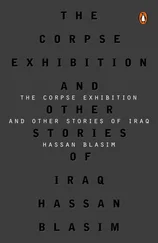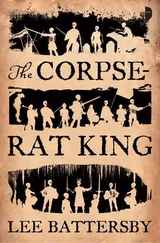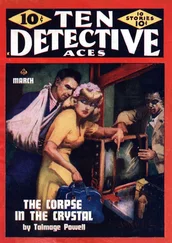After a heavy silence, he asked me: “Did you work with your father?”
“No.”
“How come? My son, the one you just saw waiting outside in the car, works with me and his two brothers as well.”
“God didn’t will it.”
He smiled. I asked him how he came to know my father. He said that for ten years he’d been in charge of collecting unclaimed, abandoned, and unidentified corpses from hospitals and from the morgue. He saw to it that they were washed, shrouded, and properly buried.
“Is it a governmental department or a charity?” I asked.
“No, it’s unofficial. Just a personal initiative I started myself, but I have an agreement with the Ministry of Health and Hospitals. This is how I came to know your father, God have mercy on his soul. He washed some of the bodies we found.”
“And how are things nowadays?”
“It’s very chaotic. I’m sure you know that most ministries were looted and destroyed, but the Ministry of Health wasn’t, as far as I know. I’m waiting for things to settle down, so I can continue. I’m trying to get permissions from the American army so they don’t attack my trucks and team when they go around the city. But even the Americans are disorganized. Each one sends me somewhere else. First they said I had to go to the Green Zone — you know, where the palace used to be — but then they wouldn’t let me go in. They said I had to get permission and forms from the Conference Center, but nothing materialized.”
“And who covers the expenses?”
“There are still a lot of good human beings in this world. I receive monthly donations.”
“God bless you and may there be more like you.”
“Well, why don’t you work with us then, like your father did? I’m sure you know how to wash.”
“Yes. I learned it from him and worked with him for a while, but that was years and years ago. Hammoudy, who used to work with my father, has taken over the place and will be working there. You can discuss it with him.”
“Oh, that’s great. I know Hammoudy.”
Hammoudy had approached me a week after my father died about taking over the mghaysil. He suggested paying us half of the income as rent. I agreed without much thought, because we desperately needed the money. The housepainting market was dead, and I was looking hard for any type of work, without success. Instead of Iraq becoming a new Hong Kong, as the Americans had promised, there was chaos and massive unemployment. I said goodbye to the man, never imagining that he would come back into my life.
“So you think painting or making statues is better than my honorable and rewarding profession?”
Father had often wounded me with this question when I told him of my desire to become a sculptor. I was burning to tell him now. They are stealing statues these days, Father. They stole Abdilmuhsin al-Sa’doun’s statue, melted it, and sold it. Those who don’t steal statues pull them down because they want to rewrite history. Ironically, they are imitating their sworn enemy, who himself tried to rewrite history from a Ba’thist perspective, destroying many statues and putting up new ones in their place.
History is a struggle of statues and monuments, Father. I will not have a share in all of this, because I have yet to sculpt anything important. Even Saddam’s huge statue in Firdaws Square was brought down right after your death. I thought I would be happy since I detested him so much, but I felt I’d been robbed of the happiness. That was not the end I had imagined. Those who brought him down were the ones who put him there in the first place. They armed him to the teeth in the war that killed Ammoury, your favorite son. Now some want to sever the head of Abu Ja’far al-Mansour, the founder of Baghdad, and bring down the statue of the poet al-Mutanabbi. Even the statues are too terrified to sleep at night lest they wake up as ruins.
I thought I had succeeded in distancing myself from death and its rituals during the two years following Father’s death. But I discovered that even though I wasn’t dealing directly with it with my own hands, death’s fingers were crawling everywhere around me. I couldn’t shake the notion that death was providing my sustenance. For a time I leaned on a rationalization: What has really changed? Weren’t things the same when my father was the provider? Didn’t I eat and drink what death earned for us, one way or another? I used to contribute a bit to the household expenses. The only difference now is that death is more generous, thanks to the Americans.
Hammoudy stopped by at the end of every month to give me half of the earnings. Whenever I asked him how things were at the mghaysil, he said that there were more and more corpses. I knew that already, because the amount he gave me was increasing month by month. I asked about the men he washed. He said most had been killed by the Americans, but there were also many victims of the unprecedented wave of crime, as well as those blown up by car bombs and other explosions.
All my attempts to find a job failed. I started to spend most of my time reading and browsing the Internet. Ufuq café on al-Zahra Street near our house became a daily stop for me. I was naïve when I chose “giacometti” for a username for my e-mail account. Hundreds of others had chosen it too. After several variations were rejected, I settled for his name together with the year I was born. I looked for Reem the first few days, but to no avail. I had been seriously thinking of continuing to study sculpture abroad. I realized that getting a scholarship was not easy and that not only would it be expensive to travel and live abroad, but it would be almost impossible to transcend the language barrier. My English amounted to the little I had learned at school and a few sentences I had picked up from films. Nevertheless, I started to gather information and wrote to a few institutes and arts colleges. Their answers were usually formulaic: they thanked me for my interest, advised me to read the prerequisites and requirements, and stressed the issue of the visa.
I asked Professor al-Janabi for advice. He was encouraging and promised to write a letter of recommendation, but reminded me of the importance of having a strong portfolio to increase my chances of acceptance. I had not participated in any exhibitions since graduation. He told me straight up that I had to get serious again about producing art. I bought a small digital camera to take photographs of some of my old works.
Three months after the invasion, Professor al-Janabi called me on my new cell phone. He said that the French Cultural Center was organizing an exhibition of young and marginalized artists and encouraged me to participate. I could submit only one work, so I chose one that had caused some trouble back when I was still studying. It was a strange-looking iron chair I had found thrown out on the street while wandering around with Reem near the academy. It was old and had some rust on it. I decided to carry it off. Reem laughed coquettishly: “Are you already furnishing the nest?” “You know I’m against the idea of marriage,” I said. “I just got an idea for a piece.” When I took it to the academy to put it in our shop, the security guard ridiculed me, saying, “What’s this? Are you selling scrap now?”
I bought some metal chains from Bab al-Agha and added them to the chair’s arms and front legs to make it look like a torture chair. I had planned on submitting the work to the annual exhibition, but Reem said I would be endangering myself for no reason. Professor al-Janabi agreed that it was too dangerous. I even thought about adding a tiny cage to it and putting a real bird inside. Reem said it was a good idea, but she preferred it with the chains alone and no cage or bird. “It doesn’t change the main idea and it’s still dangerous to show it.” Al-Janabi liked it a lot, so I gave it to him as a gift. He refused at first, but I told him it would be an honor if he accepted. The chair stayed in his office all those years. He made sure not to put anything on it despite the piles of papers and books he had in his office. He gladly lent it back to me for the exhibition, and it was accepted.
Читать дальше












